At 21 weeks a fetus doesn’t have the ability to breathe outside a woman’s body. The alveoli, the tiny sacs that fill with oxygen, haven’t fully developed, and its premature lungs lack surfactant, the slippery substance that keeps those tiny air sacs from collapsing and sticking together when they deflate.
But imagine if that fetus could be placed inside an artificial womb, a translucent, plastic, fluid-filled vessel that closely mimics the uterine environment, an oxygenator powered only by the fetal heart. Artificial wombs are already being used to incubate immature baby lambs that are developmentally equivalent to extremely premature human infants. Some are convinced it may soon become possible to put viable human fetuses — including unwanted ones — inside an “extracorporeal” uterine device where they would grow, bathed in artificial amniotic fluid, until their lungs, brains and other organs matured while technicians watched from the outside, playing soothing sounds of a maternal heartbeat.
It is just one way new technologies are pushing the boundaries of “fetal viability,” challenging our ideas about what constitutes the beginning of life, and confronting us with discomforting questions about abortion.
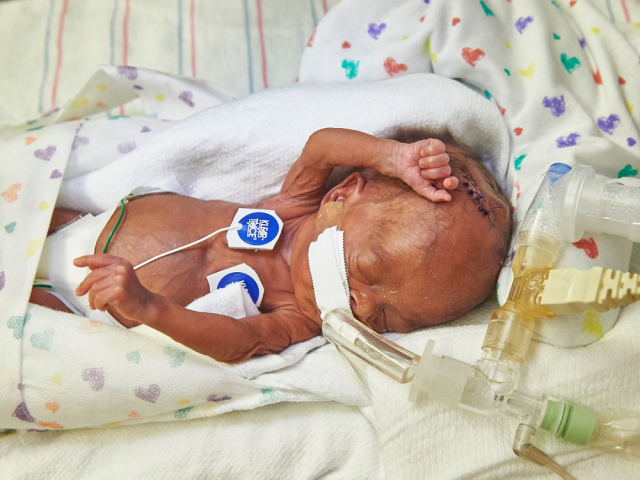
A vast majority of Canadians believe abortion should be illegal in the third trimester of pregnancy, from 28 weeks onward. But if a fetus could be grown in “biobags,” how might we feel about abortions even in the second, between 14 and 28 weeks?
Debating such questions in Canada is difficult when both sides of the abortion argument are so polarized that those in the middle are effectively silenced.
“There’s a middle group that, if there was anybody interested in organizing them, could probably mediate some of the stuff at the far ends of both spectrums,” says Frances Kissling, president of the Center for Health, Ethics and Social Policy in Washington and a pro-choice Catholic who once directed a New York State abortion clinic after abortion was made legal in that state in the 1970s.
“It wouldn’t make everybody happy. But nobody is happy now, anyway.”
That middle group is widely represented in our society, with a new extensive national survey finding many Canadians hold more nuanced and conflicting views on abortion than either side would have people believe.
——-
Thirty two years after the Supreme Court of Canada struck down Canada’s abortion law, 32 years after a triumphant Dr. Henry Morgentaler stood outside his Toronto abortion clinic and told a cheering crowd, “every child a wanted child, every mother a willing mother,” a DART & Maru/Blue poll conducted for the National Post finds seven in 10 Canadians consider the current situation on abortion — no legal restrictions on abortion, at any stage of pregnancy — acceptable.
“Outside of a fraction of the country, the abortion issue, on the whole, as a medical transaction, seems done,” says long-time pollster John Wright, a partner with DART.

Wright first surveyed the Canadian populous on abortion in 1989, the year Jean-Guy Tremblay obtained a Quebec provincial court injunction preventing his ex-girlfriend, Chantal Daigle, from getting an abortion. Daigle appealed to the Supreme Court, which would set aside the injunction, ruling that the “substantive rights which are alleged to support it — the rights accorded to a fetus or a potential father — do not exist,” further entrenching the Morgentaler ruling.
When the Angus Reid Group (of which Wright was then a senior vice president) polled Canadians, 44 per cent of those surveyed believed abortion should be legal in some circumstances, 32 per cent said when the woman wanted it and 22 per cent said it should be prohibited unless the mother’s life was at risk.
The new DART poll found just one in 10 considers abortion unacceptable. The majority, 71 per cent, said a woman should be able to get an abortion should she decides she wants one, no matter the reason.
It was a very different landscape three decades ago, Wright says. “The country was far more polarized. There has been a significant maturation of the Canadian public’s view on this.”
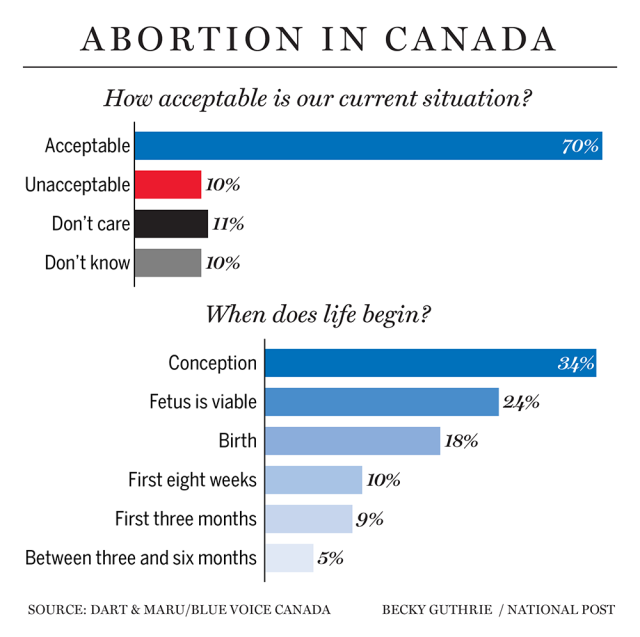
However, when he looks at the data, Wright sees a much deeper issue, “a quandary that that now puts abortion in the realm of the assisted dying debate.”
“We are past the stage of whether or not we should have the moral, ethical, legal and legislative right” to a doctor-assisted departure from this world, Wright says. “On that issue, we’re now into the weeds of deciding the final what and when. And that’s comparatively where the abortion issue is now,” he says.
“As a debate, we’ve pretty much settled on the big decisions, so anything now is also now about the what, and when.”
Although two-thirds (62 per cent) of Canadians, led by Quebec and B.C., identify as primarily pro-choice, and only one in 10 as pro-life (led by Alberta, at 19 per cent) one quarter of Canadians said they don’t fit neatly into either category. Moreover, the poll found a surprising consensus when abortion should and should not be legally permitted: Nine in 10 Canadians believe abortion should be legal in cases of rape or incest.
But then it bridges into tough areas of ethical and moral debate.
As a debate, we’ve pretty much settled on the big decisions
Three quarters believe an abortion should be legal when there’s evidence the fetus may be mentally or physically impaired. Si
x in 10 believe abortion should be legal if the woman or family can’t afford to raise the child.
Almost unanimously (93 per cent) Canadians believe doctors should be required by law to inform women about potential risks of surgical abortion before performing the procedure, which, while rare, include infection and hemorrhage. More than three quarters favour a law requiring doctors to inform women about alternatives to abortion, such as adoption. Two-thirds would back a law requiring women seeking abortion to wait 24 hours between counselling and having the procedure done. Half believe there should be a law requiring women under 18 to get parental consent for an abortion. Seven in 10 say abortion should be generally illegal in the last three months of pregnancy. Only 57 per cent believe abortion should be generally legal in the second trimester.
A dominant majority reject outright abortions for sex (usually son) selection.
Canadians may be broadly fine with abortion — when asked whether the government should reopen the issue of abortion, three-quarters believe things should be left as they are, thank you, particularly the university educated and the young. But even then we seem conflicted. When told Canada is unique in the world in that it has zero legal boundaries on abortion, half of Canadians think politicians should at least be willing to talk about providing some regulatory framework. In Quebec, where 73 per cent described themselves as primarily pro-choice, people are more likely than the Canadian average (52 per cent vs. 49 per cent) to support some kind of national dialogue on abortion.
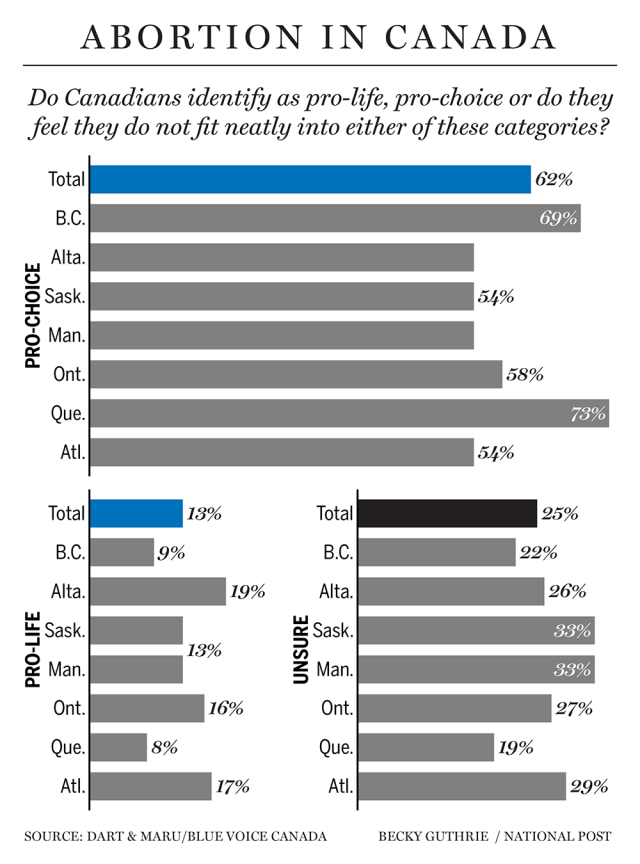
There is a deep current of public sentiment beneath the surface that isn’t yet resolved, Wright says. “That’s the soft spot of the debate,” he says. “The question is, ‘Who wants to put it on the table?’”
Allegations that he’s an anti-abortion zealot who would overturn the status quo on abortion dogged Conservative leader Andrew Scheer, a practising Catholic, throughout last fall’s election campaign. While eventually declaring “I’m personally pro-life,” and vowing that any government led by him would not bring in legislation to ban abortion, many Canadians were nervously looking over their shoulder at the U.S., where Republican-led states are passing some of the most restrictive bans on abortions in the near 50 years since Roe V. Wade made abortion a constitutional right in the U.S.
Alabama has criminalized abortion at virtually every stage of pregnancy, including in cases of rape or incest. Half a dozen states have introduced so-called “heartbeat bills” that ban abortion when fetal cardiac activity can be detected, meaning as early as six weeks pregnancy, a time when many women do not even realize they are even pregnant. In March, the U.S. Supreme Court will hear its first major abortion case since President Donald Trump appointed two new conservative justices to the bench, a case many observers believe begin a chipping away at Roe v. Wade. When New York last year lifted a criminal ban on abortions after 24 weeks, Trump said it would effectively allow a fetus to be “ripped from the mother’s womb moments before birth.”

It was deliberately incendiary, but the rhetoric is increasing, on both sides: When women are being encouraged to wear “I had an abortion” T-shirts, or to “shout” their abortion stories, the attitude borders on the “ghoulish,” Caitlin Flanagan writes in The Atlantic. “Who could possibly be proud that they see no humanity at all in the images that science has made so painfully clear,” she says, alluding to four-dimensional ultrasound — 3-D images of the fetus that move in real time — capable of capturing thumb sucking, or a yawn. Anti-abortion advocates don’t get a free pass, either. When pro-lifers speak of babies being sucked out of wombs, “they show themselves without mercy,” Flanagan says. “They are not considering the extremely human complex and often heartbreaking reasons behind women’s private decisions.”
Justin Trudeau, whose own personal views of abortion have “evolved” over the years, declared his party “resolutely pro-choice” in 2014, the year before becoming prime minister, vowing all votes on the matter would be whipped in favour of abortion rights.
The extremes on both sides control the politics, engaging in the equivalent of entrenched warfare, ignoring the moral complexities and reducing the debate to absolutist positions, says Kissling.
“People on both sides of the issue are nervous about speaking about things that are ethically complex, because how will those things be used by people on the other side,” Kissling says. Give an inch, and you give away the store.
People on both sides of the issue are nervous about speaking about things that are ethically complex
There are prices to be paid for nuance, and so people stick to the simple line, even though there is often remarkable overlap in what people in opposing camps believe.
“Those of us who are pro-choice present pro-lifers as adamant — ‘no abortion for any reason, just let the woman die,’” Kissling says. Pro-lifers present pro-choice people as believing abortion on the way to the delivery room is entirely acceptable. “Neither of those things is true,” Kissling says.
——-
Just over 85,000 abortions were performed in hospitals and clinics in Canada in 2018, the Canadian Institute for Health Information reported this week. That’s down from 94,000 in 2017, the year the abortion drug Mifegymiso became available, allowing women to have an abortion in the privacy of their own homes. The pill, which is actually a two-pill regimen, can be prescribed within the first nine weeks of pregnancy. A normal pregnancy lasts about 40 weeks.
When in that pregnancy does human life begin? Again, the views are complicated and nuanced. More than one third of Canadians polled by DART & Maru/Blue believe life begins at conception, even though the majority believes abortion should be
fully legal in the first trimester. One in five believes life begins at birth, and one quarter when a fetus is “viable” and can live outside the womb.
Roe v. Wade made the viability an important legal concept; a position reaffirmed by the U.S. Supreme Court in 1992, when it ruled that, “prior to fetal viability, a woman has a constitutional right to obtain an abortion.” A state can prohibit abortion after viability, unless the woman’s life or health is at risk.
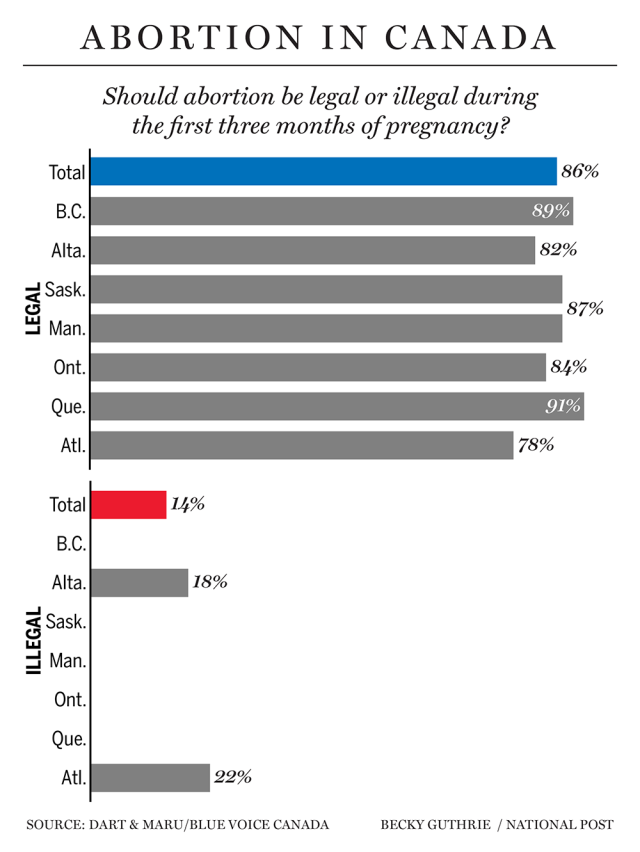
According to the Canadian Medical Association’s policy on induced abortion, viability may be possible if the fetus weighs more than 500 grams or is past 20 weeks gestation. The Canadian Paediatric Society’s view is that “survival is uncommon” for infants born below, or at, 22 weeks.
But technology is pushing the threshold of viability ever further back, and, if transfer to an artificial womb becomes possible, as many believe it will, could states mandate that all fetuses be extracted, if it can be done so safely, and gestated outside the mother’s body?
“There is animal research all over the place on this, so it’s coming,” says Arthur Caplan, founding head of bioethics at New York University Langone Medical Center says. “I think there will be a push to restrict abortion in the second trimester. I think there will be states arguing they have the right to rescue viable fetuses and put them in an artificial womb environment while you work out adoption polices, or you let the mothers think about it again — ‘do you really not want this baby?’”
Others say the idea of thousands of fetuses swaddled in biobags or plastic pouches is an absurd dystopian, Handmaid’s Tale fantasy. The science isn’t about creating “ecto-babies,” but rescuing severely premature newborns. Yet science is intersecting with the abortion debate in even more immediate ways.
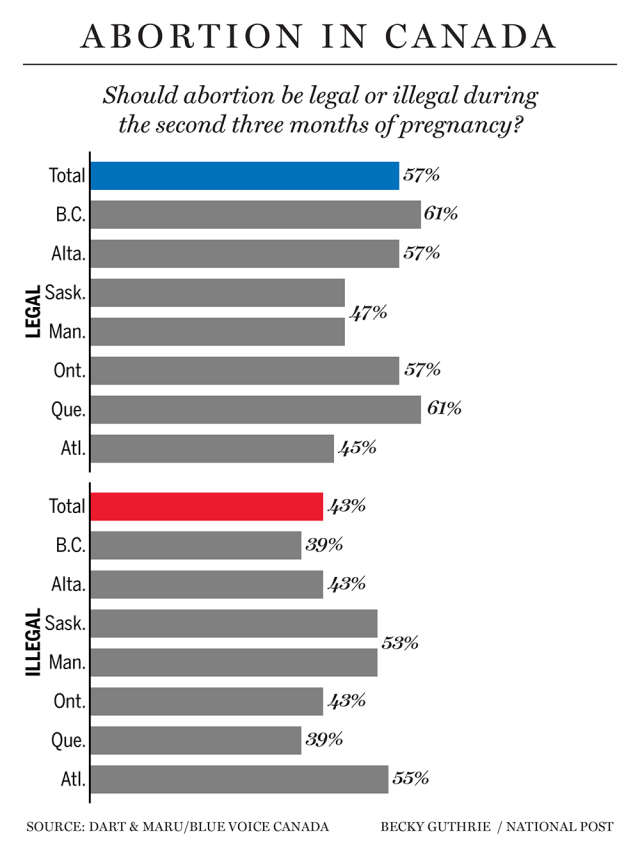
Prenatal surgery — surgery on the unborn fetus to fix devastating defects of the brain or spinal cord such as spina bifida — is one of the most rapidly growing fields of pediatric medicine. The mother is anesthetised, her uterus exposed via an incision in the abdomen (or the womb accessed through portholes) and the necessary surgical repair completed.
Fetal surgery, Caplan argues, treats the fetus more like a patient, which makes the “patient” more “personhood like.”
To Caplan, personhood and the moral status of the fetus isn’t just defined by the properties a fetus has — a heartbeat, brain, spinal cord. It’s also partly a social issue, he says. “Can we see them? Can we diagnose them? Do we treat them?”
The Daigle case found a fetus has no legal status in Canada as a person. But Caplan argues that “the more you personalize the fetus through trying to repair it, or visual it or diagnosing it, the more it becomes a real person, even if it’s lacking traits that would say it’s a person.”
“That makes them rise up in moral standing.”
There have been no successful bids in Canada to legislate restrictions on abortions since the Morgentaler ruling. Policing goes on in both camps to keep the base firm, says Kissling. But Andrea Mrozek, of Pro Woman Pro Life, believes there are compromise, even consensus positions to be found, “like nobody supports sex selection abortion and we know that that happens.”
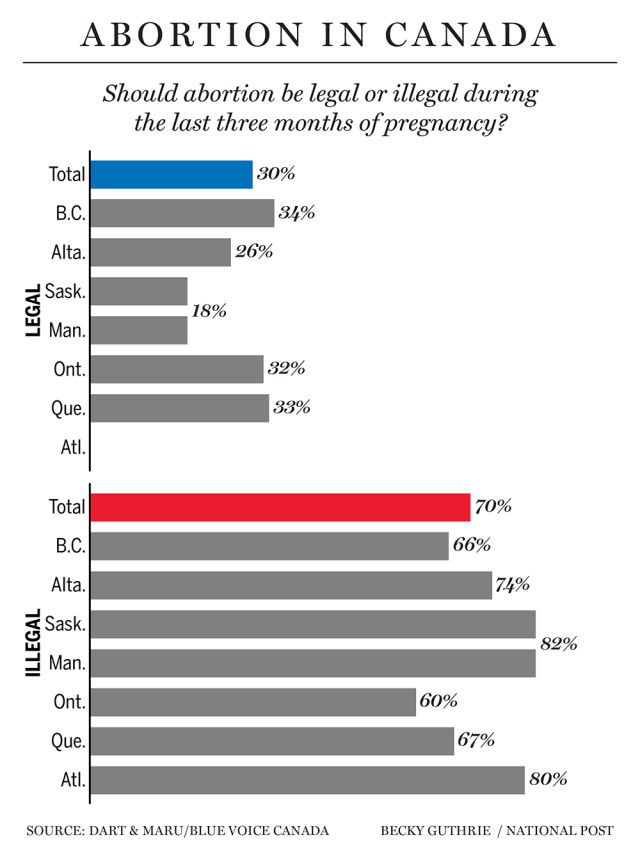
There is no abortion law, but neither is Canada the Wild West of abortion. It is recognized and governed by the Canada Health Act, and by provincial and territorial colleges of physicians and surgeons’ code of ethics. It’s considered generally safe, serious complications are rare since abortion was decriminalized and the rate of surgical abortions appears to be decreasing. Abortion after 21 weeks isn’t “readily available,” in Canada, according to a 2012 review, while third-trimester abortions almost always involve extraordinary circumstances, like lethal genetic or hereditary abnormalities.
Joanna Erdman, associate professor at the Schulich School of Law at Dalhousie University, says there’s a lack of nuance in public debates on abortion “because of the kinds of questions too often asked in public polls on abortion. Questions that aren’t meaningful to the lives of people most directly affected.”
Ask a minor with an unwanted pregnancy and unsupportive parents about parental consent, and “one would likely get a very different answer than from a random poll,” Erdman says.
“A meaningful question about abortion later in pregnancy would ask about the reasons why people seek and need abortion through pregnancy, and about the hardships endured, the resources required and the stigma suffered by many in accessing this care.”

Kissling, dubbed the “philosopher of the pro-choice movement” by Boston Globe columnist Ellen Goodman, agrees that no woman enters into an abortion lightly. “There are reasons women have abortions, and if those reasons didn’t exist many of them would continue their pregnancies,” she says.
But for many abortion is a genuinely complex moral issue. The problem is that when we say something is a moral issue, our mind goes immediately to the negative, Kissling says. “Morality is about no. It’s not about yes.”
Yet there is remarkable overlap in what people who identify as pro-life and people who identify as pro-choice believe, she says, and we need to talk about those gray areas. While our leaders prefer to stick to the messaging, their preoccupation is with the packaging, she says, “with the wrapping paper and the ribbon.
“Looking inside the box is scary.”
The DART & Mar/Blue poll was conducted among 1,515 randomly selected Canadian adult members of Maru/Blue’s online panel on Dec. 5 to 8 and is considered accurate within plus or minus 2.9 percentage points.
— With files from Stuart Thomson
• Email: skirkey@postmedia.com | Twitter: sharon_kirkey
THE BIG NUMBERS
LEGAL OR ILLEGAL? In certain circumstances should it be legal or illegal to have an abortion?
If the family does not want the baby to be a certain sex?
Legal: 16%
Illegal: 84%
If the woman or the family cannot afford to raise the child?
Legal: 57%
Illegal: 43%
If the baby is physically impaired?
Legal: 75%
Illegal: 25%
If the baby is mentally impaired?
Legal: 76%
Illegal: 24%
IN FAVOUR OF A LAW OR NOT?
Should there be a law requiring doctors to inform patients about the risk of abortion?
In favour: 93%
Opposed: 7%
Should there be a law requiring doctors to inform patients about an alternative?
In favour: 78%
Opposed: 22%
Should there be a law requiring women seeking an abortion to wait 24 hours?
In favour: 65%
Opposed: 35%
Should there be a law making it illegal to perform a “partial birth” abortion conducted late in pregnant except in cases to save the mother’s life?
In favour: 57%
Opposed: 43%
Should there be a law requiring women und
er 18 to get parental consent be
fore an abortion?
In favour: 49%
Opposed: 51%


